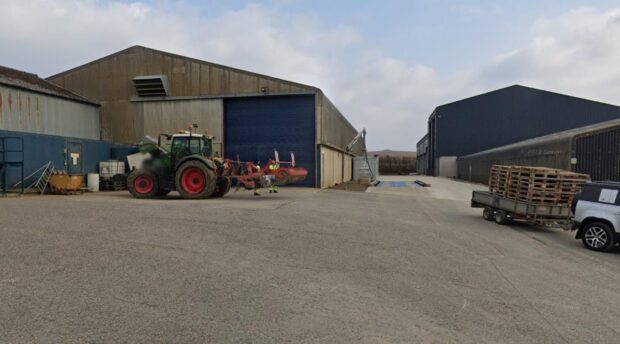A Banffshire farm has been fined £20,000 after a worker died when his hood became trapped in machinery.
Adam Currie, 24, was strangled by the moving parts of a potato conveyor at Melrose Farms near Gardenstown, a court was told.
While Mr Currie had received training for his employment, no guard had been fitted to the rollers of the machine.
Melrose Farms appeared in Inverness Sheriff Court and admitted a single charge of failing to take effective measures to prevent anyone coming into contact with dangerous moving parts of the machinery, resulting in Mr Currie’s death.
Procurator fiscal Stella Swan told the court that, on November 13 2023, Mr Currie had been employed as a returning part-time seasonal worker at the farm.
As one of four workers in the potato shed, Mr Currie had been overseeing the filling of potato boxes, with the potatoes being delivered by conveyor.
Ms Swan told the court that at around 9.05am a forklift driver had seen Mr Currie, but when he returned to the shed later he saw “excessive potatoes on the conveyor, which had stopped”.
He shouted for Mr Currie but received no reply.
Farmworker’s hood caught in conveyor
When he went to the conveyor and discovered Mr Currie “trapped by his hood, which had become entangled”.
The colleague tried to free Mr Currie but was unable to, and so raised the alarm, telling others: “Come to the tattie shed quick, Adam is caught in the belt.”
After freeing Mr Currie, several colleagues performed CPR until police arrived and assisted.
Paramedics arrived and managed to obtain a pulse from Mr Currie, who was then airlifted to Aberdeen Royal Infirmary, where a “bleak” prognosis was confirmed.
Mr Currie died three days later following negative results from brain stem testing.
His cause of death was noted as: “Ligature strangulation resultant to entrapment of garments in the moving part of machinery in an incident while at work.”
Bereaved family allowed organ donation
Ms Swan told the court that Mr Currie’s family gave permission for a number of his organs to be donated.
The court heard that Mr Currie had undergone two days of training and in-depth toolbox talks by an external provider for the health and safety aspect of his role.
He knew how to stop the machinery and often did so as part of his job.
Ms Swan said: “It has not been possible to determine why Mr Currie went below the conveyor.”
She later added that it was “inexplicable”.
She continued: “Return rollers on conveyor are a well-documented hazard and require to be guarded if access was possible, as it was in this case.”
The court heard that the rollers should have been securely guarded either by a fixed guard or by a guard preventing access – but neither was in place.
The fiscal depute noted that the position in which Mr Currie was found would have prevented him from switching off the machine, which tripped out “relatively quickly” but not before his clothing became stuck.
Sheriff Gary Aitken was told that, following the incident, the return roller had been retrofitted with a fixed guard, and mesh guards fabricated and fitted to prevent access.
Farm partners offered sincere condolences
Solicitor Jaimie McGready, for Melrose Farms, expressed her clients’ “sincere condolences to the family of Adam Currie for their loss”.
She said the company partners were in court marking the seriousness with which they took the matter.
Miss McGready told Sheriff Aitken that the company had employed an external health and safety company.
She said the specific hazard posed by the machine had not been identified during an audit, and no recommendations were made.
The court was told that the machine had run for 12,500 man-hours without incident.
She said: “This was not an accident arising from a lack of training or unsafe working practices.”
She said Mr Currie had been properly trained and “the requirements of his role never involved entering under the conveyor”.
This was “contrary to what any of the partners or staff would have anticipated”, she added.
Miss McGready also pointed to the “previously unblemished safety record” of the company, which has operated since the early 1940s.
Farm partner ‘profoundly affected’
She said one of the partners had been immediately involved in the rescue and resuscitation efforts and remained “profoundly affected”.
The lawyer told Sheriff Aitken her clients wholeheartedly accepted responsibility for the failing and said: “Lessons have been learned and taken to heart.”
Sheriff Aitken sent his sympathy to those affected and said: “No one ever thinks that they are not going to come home from work or that their loved one is not going to come home from work.
“There is a good reason why health and safety is taken extremely seriously.
“As Mr Currie’s tragic death demonstrates, a moment of inattention in the wrong circumstance can have life-altering consequences for the individual involved and many others who are affected by their injury or, worse still, their loss.
“There has clearly been a robust investigation and everything that could have been learned from this tragedy clearly has been, and steps taken to remedy that.”
Worker’s sacrifice gave others ‘second chance’
Having acknowledged the presence of members of Mr Currie’s family in the public gallery, he added: “While not directly related to today’s purpose, I feel it is only appropriate to commend Mr Currie’s own decision – given effect by his family – to allow organ donation.
“If there is any good to come from this awful tragedy, it is the knowledge that a number of people have been given a second chance at life through his decision and his sacrifice in this regard.”
Sheriff Aitken handed down a total financial penalty of £21,500, including a £1,500 victim surcharge.
